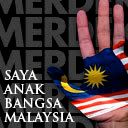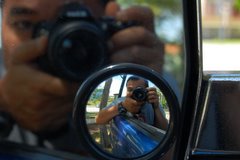One in 250 Million
What it Means to be Bolehsian - Are We Really That "Ugly"? 
This is a first of series of “street interviews” with your average Indonesian, picked at random, for no other reason than their good fortune (or misfortune, depending on how you look at it) of crossing into my path. The purpose is to delve into their psyche, and particularly, how they view that neighboring country of theirs, a “Paradise” called Bolehsia.
Hopefully it will shed some light on what makes Bolehsia tick; their citizenry, and ultimately their place in the world.
Be forewarned though, for the results might surprise you a little.
I am speaking of Bolehsians in general of which I am one, and after having read my "interview" with Kanabran a.k.a. “Macha”, an Indonesian of Tamil descent from Medan in Sumatera, you’d be well advised to ponder our behavior and attitudes towards the “foreigners” next door.
Inexplicably we call these foreigners by the derogatory term, “Indon”, a term which most Indonesians view with derision. Jelik sekali, rang their unanimous verdict - perhaps on par with calling Bolehsian Indians “Keling”, or calling a Pakistani in London, a “Wog”. Even The Star, the mainstream newspaper in Bolehsia is guilty of this. I admit sheepishly, at some point prior to being a resident here, even I too was often guilty.
Mamak Teascapes in Bolehsia
For urban Bolehsians the ubiquitous place to congregate and swap gossip is the neighborhood “coffee” shop, which invariably always is a “Mamak” joint. “Coffee” shop is thus a misnomer; because tea is often the brew of choice. These teh tarik places sweep the Teascapes of the Nation, reaching its tentacles beyond the cities and on to the kampongs. Many of you have patronized these places no doubt, and are occasionally miffed when the "waiter" sometimes mistook your order of Roti Kosong for Roti Telor. These episodes are quite understandable you see, because that dark swarthy looking creature that took your order is oftentimes not able to speak Bahasa. Not so The Macha, the protagonist in my story, because being Indonesian and having lived in Bolehsia, he speaks perfect Bahasa. At present, most of these service industry types you find in Lotus, Devi’s and places of their ilk, come from India. Their presence is by way of our Immigration Department, duly abetted by agents and their Datuk employers, often fleecing the lives out of these poor, unsuspecting "Machas". When your intrepid ASP (Agence Salo Presse) correspondent first stepped foot in Balikpapan (Self-proclaimed Kota Beriman - City of the Righteous), an oil city on the swampy edge of Eastern Kalimantan, I found it to be sadly wanting as to the choice of eateries vis a vis “Mamak”. Imagine my surprise and delight then when I stumbled upon the sole bearer of the “Mamak” flag in East Kalimantan, at a quaint little rumah makan by the sea front called the Taj Mahal.
When your intrepid ASP (Agence Salo Presse) correspondent first stepped foot in Balikpapan (Self-proclaimed Kota Beriman - City of the Righteous), an oil city on the swampy edge of Eastern Kalimantan, I found it to be sadly wanting as to the choice of eateries vis a vis “Mamak”. Imagine my surprise and delight then when I stumbled upon the sole bearer of the “Mamak” flag in East Kalimantan, at a quaint little rumah makan by the sea front called the Taj Mahal.
The restaurant came replete with reproductions of the ‘Halal’ logo in its menu, which looked familiar, because it turned out to be an exact copy of Bolehsia’s Jakim logo. For the truly righteous, the ‘Halal’ insignia is debatable. And for those on their high horse galloping on the confirmed path to Jannah (High Heaven), more appropriately it should have read “Pork Free”. And why is that? Because Macha is a Hindu.
Hindu or not, Macha’s blood cursing thorough his veins are as red as yours and mine, and his tale about his time in Bolehsia, jolted me on what it means to be a Bolehsian.
Enter The Macha
Macha is fifty seven, and after decades of toil and misery in Bolehsia, was finally able to strike out on his own in Borneo’s thriving oil town. He left Bolehsia for the very last time in September of 2004, thus making him a thirty-year veteran of the Bolehsian service industry.
Macha’s first foray was in 1975 at an estate called Ladang Tun Sambathan in Sungei Siput, Perak. At that time I was but a stone’s throw from Macha, being in my first year at boarding school in Kuala Kangsar, practically minutes away by car. By his own admission, he had entered illegally from Medan, by boat to a clandestine spot along Perak’s serpentine coast. At the estate he was initially paid a "hefty" five ringgits a day. After a few years of relative anonymity he was eventually caught and sent back to Medan. Wising up, Macha came back with a passport, working illegally each time on a three month social visit pass. For extensions, Macha had to exit the country every three months, usually at a border post between Siam and Bolehsia.
Under the able stewardship of Che Det factories mushroomed in Free Trade Zones and Entrepreneur Parks. But its insatiable appetite demanded it be fed with more and more cheap labor from a "neighboring" country. Isn’t it strange whenever Bolehsian news say of a "neighboring country", Bolehsians without a doubt knows it means “Indonesia”?
From the estates, Macha then graduated to factory work; once even worked at a factory in “Sinawang” (Senawang) that made garments. I smiled at the coincidence because in the early nineties Senawang in Seremban was my first matrimonial home when my wife was stationed there as a bank branch supervisor.
Macha was often caught and deported, and the “cycle” continued. In those days immigration records were yet to be computerized so it was easy for Macha to make a new passport and enter the country again. In 1991 the government realized it needed to streamline measures to deal with the influx of migrant labor. Thus the permit-to-work system was born, with prohibitive fees and levies and a monstrous bureaucracy to go along with it. As a side-effect, it also created "economic opportunities" for unscrupulous agents, officials and their patron politicians. Post 1991, two thousand ringgits a year went out of Macha’s shallow pockets to keep his Employment Pass in order - to agents ‘inside’ the Immigration Department located in Pusat Bandar Damansara. On two of these occasions, after having paid the fee, Macha will show up the next day to collect his passport and pass - only to find the “inside” agent “missing”. Not only had the “agent” absconded with his hard-earned money, but also his passport. Who knows how many victims suffered this fate? With no one to turn to, Macha was immediately apprehended, sent to detention camp and subsequently deported.
Post 1991, two thousand ringgits a year went out of Macha’s shallow pockets to keep his Employment Pass in order - to agents ‘inside’ the Immigration Department located in Pusat Bandar Damansara. On two of these occasions, after having paid the fee, Macha will show up the next day to collect his passport and pass - only to find the “inside” agent “missing”. Not only had the “agent” absconded with his hard-earned money, but also his passport. Who knows how many victims suffered this fate? With no one to turn to, Macha was immediately apprehended, sent to detention camp and subsequently deported.
In the second of these sad episodes, he remembered the name of the agent that had fleeced him.
‘Rajah’, said Macha.
‘What, a Malaysian Indian, Macha?’ I asked.
He replied in the affirmative, but then added, a bit unnecessarily in my opinion, ‘Malaysian Indians are the worst, Sir – eighty percent they “eat” their own kind’.
Whoa – wait a minute, this statement begged to be explained and I replied in a tirade of counter-arguments.
For people of Indian descent like him, he claimed, the normal avenues of employment were mostly Bolehsian employers of Indian origin. The employers, he added, were often powerful party (read: MIC) people, and his last “boss” was a “Datuk Doraisamy” of a certain Mamak restaurant chain fame.
He relented to my verbal onslaught, and admitted that the Datuk had once sprung him from the lock-up in Petaling Jaya. See? They can't be all "bad", as I sat there smug in my ability to convince him. But then, why was he detained in the first place? It was harassment in its various guises of course.
His employer of the day (not necessarily as what was stated on his Pass) also holds his passport hostage to keep him from eloping. For "safety" he keeps a photocopy of the Pass in his wallet, in case he gets “stopped” by officials on raids by Immigration and its sidekick, the comical RELA.
Sometimes when for some reason the raids ‘go bad’, Macha gets thrown in the lorry anyway. Pass or no Pass. Because often, he claimed, the RELA goons rip the photocopy, decrying it as a fake. Then, bound and handcuffed, he gets sent to a place called . . .
‘Se-men-ni’, said Macha.
‘What?’ I replied, between mouthfuls of roti canai and sips of teh tarik.
‘Se-men-ni’, he said slowly. At least that’s how I heard it.
‘Oh, Se-me-nyeh laa Macha . . . that’s near my kampong, Lenggeng. I was brought up by my grandparents there’, delighted that he’d once been near my village.
But there was no delight in his voice nor his facial expression. In fact, his face had turned into an ugly snarl.
“Ling-ging”, he voiced croaked, his eyes averted away from mine, deflecting a painful memory.
“Why, Macha?” I had yet to make the connection.
Suddenly, it dawned upon me. Yes, of course, the infamous Lenggeng Detention Camp, where scores of people had disappeared and some say, killed - extra judicially. Suaram (Bolehsian Human Rights Group) had once described of the Camp’s atrocious conditions, ill-befitting in my view, of a kind and compassionate Nation.
Suddenly I am embarrassed, for I am a Bolehsian, and from Lenggeng at that, a place of bittersweet childhood memories and now forever tainted by that abomination of a Detention Camp that smacks of Hitler’s concentration camps and Soviet gulags.
I am horrified, to put it mildly. Macha was there at the ‘1998 incident’ having been caught just prior. As for Macha being caught, I had already lost count of the number of times that he has mentioned this. He was often beaten at the center, he claimed, the favorite being the banging two detainees’ head together. “Head banging” now has now taken a new meaning for me.
To refresh your memory, here’s the full story as appeared on International Herald Tribune dated Friday, March 28, 1998.
Fiery Uprising Kills 8 Detainees in Camp And a Police Officer: Crackdown In Malaysia Sets Off Riot By Illegals
By Thomas Fuller International Herald TribuneFriday, March 27, 1998
Nine people were killed Thursday as hundreds of illegal Indonesian immigrants rebelled at a detention camp here hours before they were to be deported across the Strait of Malacca.
The immigrants, using metal rods and sharp sticks, killed one police officer, injured more than 30 others and burned down half of the Semenyih Detention Center.
The police retaliated, killing eight detainees and injuring scores more, according to a police spokesman. [Emphasis mine]
The deaths were the first casualties of Malaysia's campaign to crack down on illegal immigrants. As the economic crisis continues to unfurl across Southeast Asia, thousands of refugees have sailed from Indonesia, seeking work in wealthier Malaysia.
Kuala Lumpur has turned them back. Faced with the prospect of unemployment for the first time in more than a decade, the country has sealed its borders and last week launched a small fleet of naval vessels and police boats to stop the refugees before they reached Malaysian shores. The campaign is called Operation Nyah, or Go Away.
Police in Semenyih, which is about 40 kilometers (25 miles) from Kuala Lumpur, said the riot occurred after the inmates from the Indonesian region of Aceh learned that they would be next in the deportation schedule. Deportation procedures at four camps in peninsular Malaysia started just after midnight Thursday, according to Ghazali Mohammed Amin, a police spokesman.
"The operation received resistance from the detainees," he said. "They were very aggressive."
The police would not elaborate on what happened next but residents around the Semenyih Detention Center said they heard gunshots at about 3:30 A.M. and then smelled smoke. "We saw flames four or five meters high," said Ramanam Lingam, 29, who said he could see the fires from his house near the center.
By midafternoon, four detention blocks had caught fire in Semenyih, and smoke and flames continued to engulf several buildings.
Evidence of the riot could be seen on the exhausted faces of policemen dressed in dark blue padded uniforms. They sat across from the detention center, some of them holding broken or bloodied riot shields. One policeman, who was asked by a photographer whose blood it was, responded: "Both sides."
Many of the Indonesian detainees here come from a region in northern Sumatra called Aceh. Many Acehnese say they will be persecuted if they are sent back home. Hundreds of them fled to Malaysia several years ago to escape fighting between the Indonesian Army and Aceh separatist rebels, fighting which has subsided.
"The operation was targeted at Aceh people," Mr. Ghazali said. "Because they have been here for too long."
A leader of the Acehnese National Liberation Front in Kuala Lumpur disputed the official figures of inmate deaths on Thursday. "Twenty-four of our people were killed, six wounded," Razali told Reuters, saying he had contacts with camp members.
The deportation of the Acehnese was criticized by at least one human-rights group in Kuala Lumpur, which labeled the detainees "refugees" rather than illegal immigrants. The Acehnese "are in imminent danger of returning to Aceh where they risk torture, extrajudicial execution or disappearance," said Elizabeth Wong, coordinator of Suaram. She called on the United Nations High Commissioner for Refugees and the International Committee of the Red Cross to "intervene in this crisis."
Police encountered resistance at two other camps during the deportation, but no deaths were reported at those centers.
At the Lenggeng camp, about 60 kilometers southeast of Kuala Lumpur, 140 inmates escaped during the operation. The police said just 37 were recaptured.
By the end of the day, about 1,500 Indonesians were deported, all to Sumatra, the police said. In Semenyih, about 20 buses filled mostly with women and children were seen leaving the camp.
Some 10,000 illegal immigrants, mostly from Indonesia, remain in the four camps, Rahim Noor, chief of Malaysia's national police, said. "We will send them back," he said, without specifying when. "We started on a peaceful repatriation process without any sweat and tears (emphasis mine), but it turned out to be otherwise."
The anti-illegal-immigrant campaign has received high-profile coverage in the Malaysian media for weeks. On Thursday, following the riot, the evening news program on Malaysia's state-run television channel carried no film coverage of the incident, and a report on the riot on the CNBC cable channel was blacked out in Kuala Lumpur [emphasis mine].
I had only re-read this news after my interview with Macha, but what he told me earlier was still fresh in my mind. As there was a news black-out at the time, it was indeed chilling coming from an inmate who was present.
Macha’s version:
‘The police opened fire indiscriminately . . . I saw more than fifty bodies’, said Macha. Obviously the under-inflated figure you read in the news had to come from the Government since no news agencies were allowed inside the camp.
‘Pak, actually one of the wives of the inmates was raped by one of the guards, and then killed, and the husband went berserk. Then all inmates got upset, and all hell broke loose’, continued Macha. To my mind, I already knew why the inmates were killed, and it hinted at a cover-up -kill the witnesses. You only have to look at the lopsided tally of the eventual outcome to know why. 8-1, 24-1 (other reliable sources), and Macha: 50-1.
My God, I told myself, are we as bad Bush and his cohorts? Is Bolehsia a lot like US of A ?
No wonder our flags look so much alike.
These stories of raping and killing are not new of course, only they never appeared on the mainstream media’s radar. Go back to the times of Vietnamese Boat People if you please. I pressed Macha for specifics. Macha claimed the molestation of the female charges was rampant, where the victims were taken away from camp, far from prying eyes. The violations happened at a village someplace else in Negeri Sembilan, he had heard, but not too far away. He can't remember the name. Some were killed, said Macha, their bodies never to be found. The inmates talked about this all the time, he added. I can imagine now how a riot can happen if these claims were indeed true.
Enough, I just had to get away from, and perhaps re-visit Macha at another time. A person can only “take” so much, and I was no exception.
After handing 40,000 rupiahs to Macha for the excellent white rice, roti canai, chicken curry, “mouth washing” banana and teh tarik, I looked him straight in the eye, and with as much sincerity as I could muster, apologized. Not only from me, but from all peace loving, clear and level-headed Bolehsians.
In light of our treatment of their migrant brethren, I walked out of his shop unsure that among the sea of Indonesian faces out there, someone might harbor resentment – not towards me per se – but the Government of Bolehsia, of which I am citizen and be just as liable.
Bottom line, Macha and I are not that different, only God-given fate and circumstances separate us.
I am, indeed, a tenaga kerja and a pendatang too, albeit a very-welcomed one.
For my years as an expatriate in Indonesia, I had not once encountered any hostility in any shape or form. Indonesians to me, as a whole are warm, kind and generous. Sadly, the same could not be said of Mr. Kanabran alias Macha’s experiences, and hordes of others like him, who faced hostility and harassment on a daily basis during their time earning a living in that "Paradise" called Bolehsia.
So the next time that “Macha” with the odd-accent and indecipherable Bahasa screws up your order, just hold-on to your tongue, please.
* * *
For further reading please go here:
http://www.malaysia-today.net/Blog_surat1/2006/10/over-200-migrants-and-asylum-seekers.html
Footnote:
The reason I had bumped into Macha was I frequented the salon next door for pangkas rambut sessions. Uchi, the rather attractive owner, is my stylist. "She" has not been to Bolehsia, but a great many years ago had ventured into Kiasuland to - as she put it - cari makan, Bang. She mentioned Bugis Street. From preliminary inquiries, as my locks fell to the floor, she glibly mentioned that she was once detained at the pleasure of The Ah Beng's Republic.
Hmmm, there might be a story here, which I promise to pursue at another time?
Uchi, striking a pose in front of her salon.
©Matsalo Images, taken exclusively with the Canon Digital Ixus 850













13 comments:
Indonesian backwater notwithstanding, you do have very interesting stories to tell. As per his visa, this Macha friend of yours may have served me teh tarik at the Shaaz Curry House at the Glomac Center in Kelana Jaya near where I live. He does look familiar.
Looking forward to Uchi's story ...
Oops sorry if I seem to have missed the woods for the trees. Stories about persecution of illegals are as old as the seas. Even the Yanks' call for "Give me your tired, your poor, your huddled masses yearning to breathe free," etc. etc do seem a bit hollow nowadays. But we are proud of our Irene Fernandez et al.
Remember our ancestors were pendatang too.
You not-so-Ancient Mariner,
Yes, Cap'n, we are indeed proud of the likes of Ms. Irene, and most of us have forgotten our "pendatang" roots - Bugis, Minang, Kerala, Fujian, Jawa etc. When, without prompting, Macha whipped out his passport as "proof", in my haste, I failed to notice "Shaaz Curry House" in the smaller print, or else I would have grilled him about that. I was too busy setting my Ixus to Macro Mode...
Hehe... Uchi's story? Now that would surely be risque... why not. But I got to gain "her" trust first... Thanks for the kind words and for dropping by. God Willing, we'll be TT'ing a lot sooner than you think!
Seeing ourselves reflected in the eyes of others is very sobering indeed!
Macha...stories like this are all around us...who can put them better gets the message across!
Good one.....UCHi mama....whats her story like then?
Nice imagery for your logo. Care to give us some insights as to how it sums you up.
I think we are 'ugly' cause our main concern is not to 'drop our water face'. We never want to admit our weaknesses and mistakes. So how could we ever learn when all we care for are the bouquets but not the brickbats.
Hopefully reading your blog and others will be the first step towards this realization. - YOY
the superficial me wud prefer your uchi story the volume of mamak's n his retired to the confines of footnotes.
You are now officially under the siput babi's radar so take care of ur backside.
anondeliverer
Macho Mat Salo friend of Macha, was an honor touching flesh with you at Maria's. I have alsways had a soft spot for our migrant workers especially from Indonesia. THEY BUILT OUR CITIES! PERIOD.
THEY BUILT OUR CITIES!
...and who treat them like dogs!
Cina kaya, depa kata Cina memang boleh kaya sebab kuat rasuah.
Nasi kandaq laku, depa kata boh kas-kas. Yang kata mandrem pun ada.
Org Indon but rumah elok2 dekat tempat saya di Gombak ni, depa kata menceroboh.
Semua orang salah! Depa saja yang betui!
Excellent piece as usual. Well researched and versed.I've met a few macha's and to a certain extent uci's too. Errr, gain her trust, but not too much aaaa.
On a more serious note, I do agree with anon that you are now on siput babi's radar, so be aware of that. Take care.
my dear,
This was a nice read. I am sad to say that in a lot of cases, what the Macha said abt his Malaysian brethren is true.
My dad and I can second that. That's why till today we live in mixed neighbourhoods
'Indon' is a derogatory term?
Hmmm, there might be a story here, which I promise to pursue at another time?
When? We are still waiting, pak den has a very good memory, hehe
Post a Comment